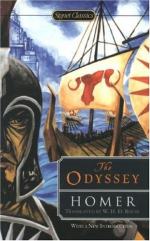So spake he, and they gave good heed and hearkened. Then straightway they embarked and sat upon the benches.
Thus was he busy hereat and praying and making burnt-offering to Athene, by the stern of the ship, when there drew nigh him one from a far country, that had slain his man and was fleeing from out of Argos. He was a soothsayer, and by his lineage he came of Melampus, who of old time abode in Pylos, mother of flocks, a rich man and one that had an exceeding goodly house among the Pylians, but afterward he had come to the land of strangers, fleeing from his country and from Neleus, the great-hearted, the proudest of living men, who kept all his goods for a full year by force. All that time Melampus lay bound with hard bonds in the halls of Phylacus, suffering strong pains for the sake of the daughter of Neleus, and for the dread blindness of soul which the goddess, the Erinnys of the dolorous stroke, had laid on him. Howsoever he escaped his fate, and drave away the lowing kine from Phylace to Pylos, and avenged the foul deed upon godlike Neleus, and brought the maiden home to his own brother to wife. As for him, he went to a country of other men, to Argos, the pastureland of horses; for there truly it was ordained that he should dwell, bearing rule over many of the Argives. There he wedded a wife, and builded him a lofty house, and begat Antiphates and Mantius, two mighty sons. Now Antiphates begat Oicles the great-hearted, and Oicles Amphiaraus, the rouser of the host, whom Zeus, lord of the aegis, and Apollo loved with all manner of love. Yet he reached not the threshold of old age, but died in Thebes by reason of a woman’s gifts. And the sons born to him were Alcmaeon and Amphilochus. But Mantius begat Polypheides and Cleitus; but it came to pass that the golden-throned Dawn snatched away Cleitus for his very beauty’s sake, that he might dwell with the Immortals.
And Apollo made the high-souled Polypheides a seer, far the chief of human kind, Amphiaraus being now dead. He removed his dwelling to Hypheresia, being angered with his father, and here he abode and prophesied to all men.
This man’s son it was, Theoclymenus by name, that now drew nigh and stood by Telemachus. And he found him pouring a drink-offering and praying by the swift black ship, and uttering his voice he spake to him winged words:
’Friend, since I find thee making burnt-offering in this place, I pray thee, by thine offerings and by the god, and thereafter by thine own head, and in the name of the men of thy company answer my question truly and hide it not. Who art thou of the sons of men and whence? Where is thy city, where are they that begat thee?’
And wise Telemachus answered him, saying: ’Yea now, stranger, I will plainly tell thee all. Of Ithaca am I by lineage, and my father is Odysseus, if ever such an one there was, but now hath he perished by an evil fate. Wherefore I have taken my company and a black ship, and have gone forth to hear word of my father that has been long afar.’




